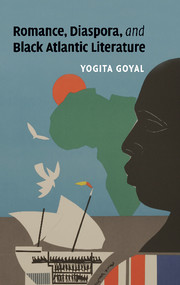Book contents
- Frontmatter
- Contents
- Acknowledgements
- Introduction: the romance of diaspora
- 1 From domestic allegory to imperial romance: Pauline Hopkins and racial mixture
- 2 From double consciousness to diaspora: W. E. B. Du Bois and black internationalism
- 3 From nativism to nationalism: Joseph Casely Hayford, Chinua Achebe, and colonial modernity
- 4 From romance to realism: Richard Wright and nation time
- 5 From revolution to arrested decolonization: Ama Ata Aidoo and the long view of history
- 6 From return to redemption: Caryl Phillips and postcolonial hybridity
- Notes
- Index
1 - From domestic allegory to imperial romance: Pauline Hopkins and racial mixture
Published online by Cambridge University Press: 04 August 2010
- Frontmatter
- Contents
- Acknowledgements
- Introduction: the romance of diaspora
- 1 From domestic allegory to imperial romance: Pauline Hopkins and racial mixture
- 2 From double consciousness to diaspora: W. E. B. Du Bois and black internationalism
- 3 From nativism to nationalism: Joseph Casely Hayford, Chinua Achebe, and colonial modernity
- 4 From romance to realism: Richard Wright and nation time
- 5 From revolution to arrested decolonization: Ama Ata Aidoo and the long view of history
- 6 From return to redemption: Caryl Phillips and postcolonial hybridity
- Notes
- Index
Summary
Princes shall come out of Egypt;
Ethiopia shall soon stretch out her hands unto God.
Psalms 68:31Claudia Tate has taught us that the domestic novels of the last decade of the nineteenth century by black women writers are not simply black Victorian love stories but rather inscriptions of their readers' political desire for justice. For Tate, the melodramatic narratives of chaste heroines, virtuous heroes, and dastardly villains stage important cultural conflicts, as post-Reconstruction era writers present the desire for civic order through portraits of genteel domesticity. Rescuing such romances from the critical scorn of previous generations, Tate and other feminist scholars explain how bourgeois decorum becomes an important emancipatory cultural discourse in these novels. The fiction of Pauline Hopkins, “the single most productive black woman writer at the turn of the century,” is central to such efforts at recovery. Hopkins herself anticipates such concerns when she lays out a literary manifesto for her black middle-class readers in the preface to her 1900 novel, Contending Forces. She poses the question, “Of what use is fiction to the colored race at the present crisis in its history?” and answers, “after all, it is the simple, homely tale told in an unassuming manner which cements the bond of brotherhood among all classes and all complexions.” Such simple tales would help the cause of racial uplift, a project Hopkins championed in her fiction and in her editorial work with the Colored American Magazine.
- Type
- Chapter
- Information
- Romance, Diaspora, and Black Atlantic Literature , pp. 25 - 58Publisher: Cambridge University PressPrint publication year: 2010



